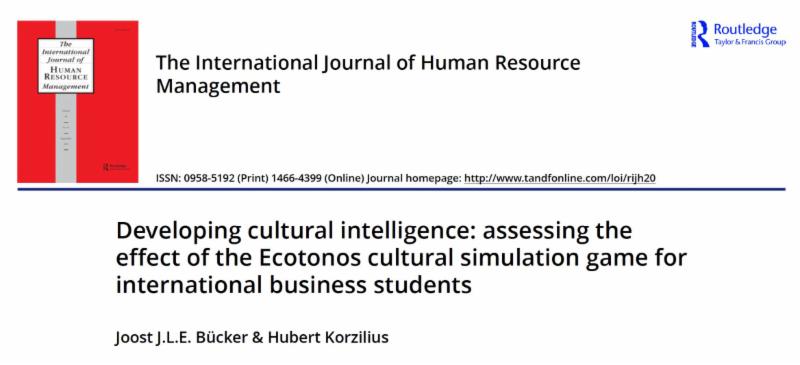| May 2017 |
Clues to Intercultural Effectiveness
Tips, Techniques and Resources
|
 |
Women in Leadership |
|
|

Cultur
al Detective
is all about supporting equality and justice,
and one of the ways we've supported gender equality and particularly women in business leadership just might surprise you! It involves the very first person to use Cultural Detective after it launched to the public in 2004...
The Story: I had a longstanding training contract with Texas Instruments in Dallas. One of the administrative assistants, Ana, was Mexican American. She reported to four US American Caucasian men, all of whom helped manage TI's business in Mexico. Ana had worked for TI for six years; she knew all the stories of success and failure between Dallas and Mexico.
|
 |
Teaming Effectively Across Cultures |
|
|

"This study shows that the use of the
Ecotonos: A Simulation for Collaborating Across Cultures
supports the development of cultural intelligence (CQ) and an increase in the development of confidence in cross-cultural encounters.
This legitimates the use of
Ecotonos
in international business education.
Ecotonos
may also be effective in preparing students for overseas internships or study abroad programs... and in multinational corporations and universities as a means to improve the CQ of their management and students."
-
Bücker and Korzilius
Since its publication in 1995,
Ecotonos: A Simulation for Collaborating Across Cultures has become a classic in the field of intercultural communication competence; it is a go-to resource for corporations, universities and NGOs that require the ability to effectively team across cultures. Two decades of anecdotal evidence strongly support Ecotonos' usefulness, but it is only recently that management researchers in The Netherlands provided empirical evidence on the simulation's effectiveness.
|
 |
Cultural Detective Facilitator Certification Workshops |
|
|
|
Join Us to Learn to Build Bridges and Inclusion
Cultural Detective Facilitator Certification Workshops are designed for small groups who share two-and-a-half days of intense, guided interaction about the Cultural Detective Model and its applications.
Anyone who needs to use differences as resources and assets rather than as liabilities will find this workshop worthwhile. You do not need to be a seasoned interculturalist; team leads, OD professionals, coaches, educators, and D&I professionals have all found these workshops highly beneficial. Even 30+ year interculturalists rave about them.
1. Cultural Detective Facilitator Certification, Portland, OR, USA
22-23 July 2017
2. Cultural Detective Facilitator Certification, Vienna, AUSTRIA
23-25 November 2017
This 2-1/2 day theoretically grounded, highly experiential and immediately applicable workshop will be sponsored by
SIETAR Austria
. Your registration fees will help support the association.
Facilitator will be
Dianne Hofner Saphiere
.
We look forward to having you join us!
|
 |
Biggest Culture Gaps Within Not Between Countries |
|
|
For nearly two decades we here at Cultural Detective have gone out of our way to teach people that culture is NOT limited to nationality, despite the fact that so many use the two words interchangeably. National boundaries are frequently rather arbitrary or externally imposed, and they can also change over time.
Culture can be a valuable guide, but it can be sliced a slew of different ways. There is a huge bias, however, even in the intercultural field, to looking almost exclusively at national differences.
Two of the graphics we use to illustrate the multi-dimensionality of various cultural influences upon most of us are above. I even wrote a blog post in June 2014 entitled,
We Are Not (Just) Our Nationality(ies).
|
 |
Can One Person Make a Difference? |
|
|
Latin
Fulani is a traditionally oral language spoken by about 40 million Fula people across western and central Africa.
Like so many oral languages worldwide, people end up transcribing them using an existing script-they superimpose a foreign alphabet onto an existing oral language.
This type of practice is rather imperialistic and it usually doesn't work very well. Such was the case with Japanese, an oral language written in Chinese characters until Prince Shohtoku invented two indigenous syllabaries for the language-hiragana
and katakana
-in the tenth century. Today Japanese remains a complicated written system of four different scripts, if we include the Chinese kanji, the two kana syllabaries, and the Latin romaji to which it's often transliterated.
|
 |
Incredible Complimentary Professional Development |
|
|
|
Webinars feature Dianne, creator of our series, or select
Cultural Detective
authors. They are designed to help participants learn to appreciate and leverage diversity as an asset, rather than seeking to minimize differences.
Tuesday, JUN 06 at 9:00 AM (GMT-6)
Participants will learn the basic Cultural Detective
Method for bridging cultures. This is our standard introductory webinar, in which participants experience the Cultural Detective Method and receive a 3-day pass to the Cultural Detective Online system.
Tuesday, JUN 20 at 8:00 AM (GMT-6)
This workshop will enable participants to explore the richness, complexity, irony, and promise of the hundreds of cultures that comprise Latin America with help of
Cultural Detective Online.
Thursday, JUN 22 at 9:00 AM (GMT-6)
Participants will learn how to make Personal Values Lenses in
Cultural Detective
.
We look forward to having you join us! Please invite your students, clients, colleagues, friends and family. Together we can build respect, justice, equity, collaboration and inclusiveness!
|
|
|
|
| |
|